
a broadly applicable incentive to commerce and creativity, through this system of limited
exclusivity. Concurrently, the Court early explained the limits of patentable subject
matter, in that “fundamental truths” were not intended to be included in a system of
exclusive rights, for they are the general foundations of knowledge. Thus laws of
nature, natural phenomena, and abstract ideas are not subject to patenting. Several
rulings of the Court have reviewed patent eligibility in light of these fundamentals.
However, the Court explicitly negated today’s restrictions. My colleagues in the majority
are mistaken in finding that decisions of the Court require the per se limits to patent
eligibility that the Federal Circuit today imposes. The patent statute and the Court’s
decisions neither establish nor support the exclusionary criteria now adopted.
The court today holds that any process that does not transform physical matter or
require performance by machine is not within the definition of “process” in any of the
patent statutes since 1790. All of the statutes contained a broad definition of patent-
eligible subject matter, like that in the current Patent Act of 1952:
35 U.S.C §101 Whoever invents or discovers any new and useful
process, machine, manufacture, or composition of matter, or any new and
useful improvement thereof, may obtain a patent therefor, subject to the
conditions and requirements of this title.
In Diamond v. Diehr, 450 U.S. 175 (1981) the Court explained that Section 101 is not an
independent condition of patentability, but a general statement of subject matter
eligibility. The Court stated:
Section 101, however, is a general statement of the type of subject matter
that is eligible for patent protection “subject to the conditions and
requirements of this title.” Specific conditions for patentability follow and
§102 covers in detail the conditions relating to novelty. The question
therefore of whether a particular invention is novel is “wholly apart from
whether the invention falls in a category of statutory subject matter.”
2007-1130
3
